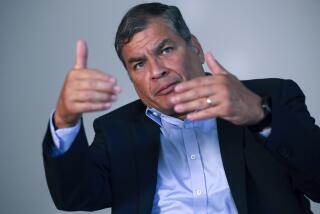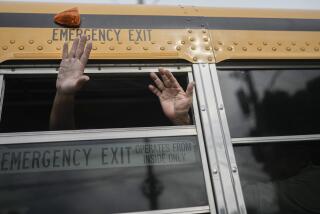Ortega Cancels Trip to U.S. in Dispute on Visas
MANAGUA, Nicaragua — President Daniel Ortega of Nicaragua on Thursday canceled a scheduled visit to the United States after the Reagan Administration failed to grant entry visas in time to half of the members of his official delegation.
Ortega had planned to travel from Managua on Saturday with a 60-member entourage to address the U.N. General Assembly in New York and the Organization of American States in Washington next week.
The American Embassy here Thursday delivered approved visa applications for Ortega, Foreign Minister Miguel D’Escoto, Deputy Foreign Minister Victor Hugo Tinoco and their security guards, among others.
Wife, Children Excluded
Excluded were Ortega’s wife, Rosario Murillo; their eight children; two government ministers; Ortega’s Harvard-educated interpreter, Alejandro Bendana, and other Nicaraguan officials and journalists.
A spokesman for the State Department said the Nicaraguans missed the deadline for applying and may not enter the United States for two weeks.
“The Nicaraguans applied late,” the spokesman, Charles Redman, said. “We require 15 working days to process their visas. The Nicaraguans applied Sept. 13 for a departure Sept. 24.”
Earlier Accord Suspended
Redman said there had been a U.S.-Nicaraguan agreement under which visas for official visits could be approved in five days, but he said that Nicaragua had suspended the agreement earlier this year, after U.S. Ambassador Richard H. Melton was ordered out of Managua in July.
He said that the 30 visas still awaiting approval may not be ready until long after the opening session of the General Assembly.
Tinoco accused Washington of violating its agreement with the United Nations by excluding members of an official delegation to the world body.
“This attitude of the U.S. government is clearly in violation of international law,” Tinoco told reporters. “It is denying the Nicaraguan government the right to be represented at the United Nations in the way the Nicaraguan government wishes to be represented. For that reason, the government has decided to suspend the visit of the president to the U.N. and the OAS.”
Earlier Thursday, the Sandinista regime charged that the Reagan Administration had deliberately imposed “an unjustified delay” on the issuance of visas to members of Ortega’s entourage.
Tinoco said later that the government is making formal complaints to legal bodies of the United Nations and the OAS so that “this arbitrary decision will not be repeated.”
“They are playing games with us,” charged Sarali Porta, a spokesman for the Nicaraguan Embassy in Washington. “It is simply exasperating.”
Asked earlier Thursday about reports that Ortega might cancel his trip, a State Department official laughed and said sarcastically: “Now, that would be terrible.”
At U.N. headquarters in New York, a U.N. protocol officer said that Nicaragua had made no request for U.N. intervention on its behalf in the visa matter.
But moments later, a Nicaraguan official there issued a statement saying that his government had called for an urgent meeting of the Host Country Relations Committee to protest an “unprecedented delay by the U.S. State Department in granting visas” to the Ortega party.
The imbroglio, the latest of many such disputes over official Sandinista visits to the United States, comes a month after the two countries expelled a number of each other’s diplomats from both capitals.
A State Department official said that almost all the Nicaraguan officials who have applied for visas eventually will get them--with the exception of Carlos Tunnermann, the former Nicaraguan ambassador in Washington who was expelled by the Administration in August for unspecified “abuses of the privilege of residence.”
Reagan Administration officials have frequently complained that visiting Nicaraguan officials, as well as Sandinista diplomats in Washington, spend too much time drumming up support for their leftist regime among American citizens.
The Sandinistas, in turn, have charged that U.S. diplomats in Nicaragua--and CIA officers assigned to the U.S. Embassy there--have been interfering in internal Nicaraguan political affairs. House Speaker Jim Wright (D-Tex.) gave credence to those complaints earlier this week when he said the CIA had been actively encouraging disruptive demonstrations by the anti-Sandinista opposition in Nicaragua.
This will be the first year since 1980 that Ortega will not be traveling to the United States, according to Information Minister Manuel Espinoza.
Boudreaux reported from Managua and McManus reported from Washington.
More to Read
Sign up for Essential California
The most important California stories and recommendations in your inbox every morning.
You may occasionally receive promotional content from the Los Angeles Times.











